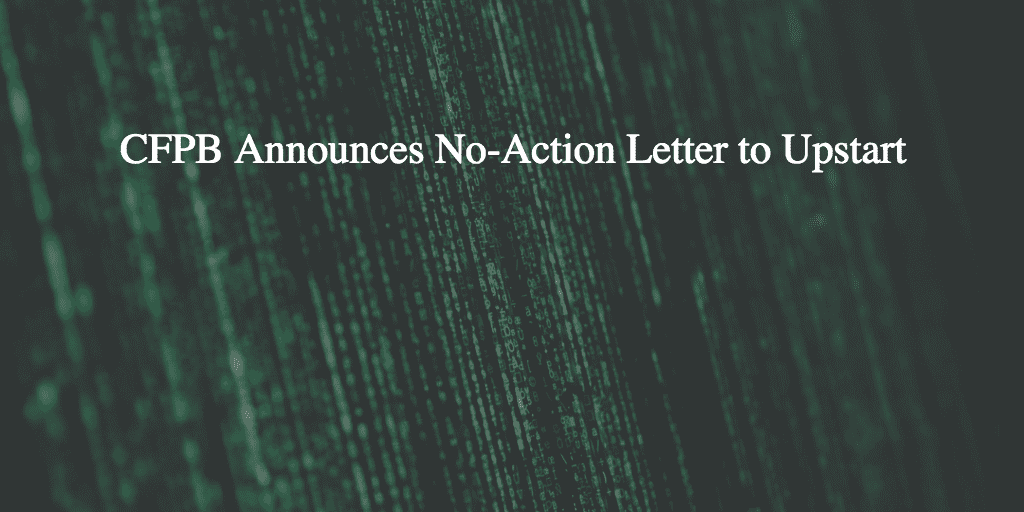The new rule forces lenders to to assess whether borrowers can repay the loans and limits rollovers, where customers take out new loans to repay old ones; the new rule is likely to face legal challenges and is primarily focused on loans under 45 days. Source
Today, the Consumer Finance Protection Bureau (CFPB) announced a no-action letter to Upstart, an online consumer lender. A no-action letter...
In a speech last week to the US Chamber of Commerce, CFPB Richard Cordray provided thoughts geared towards fintech companies stating, "One message we are sending to the industry is, you are not going to be able to take advantage through arbitrage of our regulatory system. It's not fair for you to not have to meet the same expectations that banks have to meet. If you're trying to get an advantage by not meeting the same standards, that is not acceptable and we're trying to send that message loud and clear."; Cordray also spoke on finding the right balance of fintech regulation, modernizing regulations and the Bureau's look at debt collectors and payday lenders. Source
Featured keynote speaker Richard Cordray from the US Consumer Financial Protection Bureau (CFPB) discussed the Bureau's fintech initiatives at LendIt USA; a video of the presentation can be found here; in prepared remarks Cordray discussed the Bureau's focus on both providers and consumers with three areas of special interest including: consumer-friendly innovations, consumers' control over their personal financial data and the use of alternative sources of data for underwriting loans; recent fintech innovation activity from the CFPB has primarily been centered around its Project Catalyst; on February 16 the CFPB also issued a request for information on the uses of alternative credit data with an open comment period until May 19. Source
Alternative data scoring considerations are becoming more prevalent in today's credit market; the Consumer Financial Protection Bureau (CFPB) has announced a public comment period seeking feedback on the potential use of alternative credit sources such as mobile phone bills and rent payments in credit approvals; the CFPB is seeking to identify how it might be able to serve consumers with minimal credit history; it says that approximately 26 million Americans have no credit histories and an additional 19 million consumers lack enough credit information to produce a credit score. Source
The no-action letter shows that the CFPB is open to alternative data being used to expand access to credit data; Upstart will report lending and compliance information to the CFPB to mitigate risk to consumers and aid in the Bureau’s understanding of the real-world impact of alternative data on lending decision making; the no-action letter relates to enforcement of the Equal Credit Opportunity Act and Regulation B; Upstart shares in their application how powerful using data points outside of just credit reports is in reducing borrowing rates. Source
Loan servicing company Navient has marketed support for student loan borrowers as part of its customer service strategy however its defense to a court case says the opposite; the company is being sued by the Consumer Financial Protection Bureau (CFPB) for not instituting customer service that matches its customer commitments; the CFPB's main argument is that Navient did not take into account the best interest of borrowers, specifically directing struggling borrowers into payment plans versus capped payment solutions because of the time intensive registration of the latter option; Navient blames a lack of compensation from clients such as the US Education Department for the company's service constraints; the Education Department finds no merit in Navient's defense and the CFPB has data that estimates Navient's service caused borrowers to pay an additional $4 billion in interest charges; Navient has evidence citing a significant number of borrowers in income-repayment plans and has solid arguments including that the federal law does not require servicers to counsel customers on their repayment options. Source
The Consumer Financial Protection Bureau (CFPB) was established as part of Dodd-Frank reform following the 2008 financial crisis to focus on financial law pertaining to the protection of consumers in the financial marketplace; in 2016 a three-judge D.C. circuit panel declared the CFPB unconstitutional in the PHH vs. CFPB case and gave full director accountability power to the president; an appeal by the CFPB overturned that ruling and called for a rehearing of the case before a broader panel of judges which is set for May 24, 2017; on Friday, March 17 the US Justice Department filed a brief requesting that the federal appeals court restructure the CFPB; the brief appears to be focused on the fact that the CFPB director was setup to have no accountability to the president; in the case of PHH vs. CFPB, lawyers from PHH reported that the CFPB should be dissolved; the Justice Department's brief appears to focus just on the CFPB director's accountability. Source
The Consumer Financial Protection Bureau (CFPB) has opened a comment period for information on alternative credit data. The CFPB issued the request for information (RFI) on February 16 and the comment period is open until May 19. Responses to the RFI can be found here.
The CFPB, established by the Dodd-Frank Wall Street Reform Act and led by Director Richard Cordray, is interested in obtaining information on the currently available sources of alternative credit data in the market and alternative credit data underwriting models being used by fintech innovators.
The CFPB's RFI follows an increasingly emerging financial inclusion trend in fintech. The market has seen a number of new companies seeking to make credit more accessible for thin file borrowers. Meanwhile, innovation around alternative credit data is also surfacing. The CFPB seems to be taking an active role in this emerging trend and will likely publish a comprehensive report on its findings and perspective following the comment period. Source


